Introduction
As investigative journalists, we’ve taken it upon ourselves to peel back the layers of WEWE Global, an entity that has sparked intrigue, skepticism, and outright alarm across digital forums and financial circles. What began as a whisper on platforms like X has grown into a roar of questions: Is WEWE Global a legitimate business, or a carefully crafted facade masking illicit operations? Armed with open-source intelligence (OSINT), official reports, and a relentless pursuit of truth, we’ve uncovered a tangled web of business relations, personal profiles, scam reports, and red flags that demand scrutiny. This isn’t just a story—it’s a warning. Here’s what we found when we dug into WEWE Global, with a particular focus on its ties to anti-money laundering (AML) risks and the reputational fallout that follows.
Business Relations: A Network Under the Microscope
WEWE Global positions itself as a multi-service platform, often touting affiliations with cryptocurrency ventures, affiliate marketing schemes, and tech-driven financial solutions. Our investigation revealed that WEWE Global’s business ecosystem is a labyrinth of subsidiaries and partners, some of which raise immediate concerns. We identified several key entities linked to WEWE Global, starting with LytePay, a payment processing service purportedly designed to facilitate transactions within the WEWE ecosystem. We noted that LytePay’s operations lack transparency, with no clear regulatory oversight or licensing details disclosed. Then there’s WEWE Academy, marketed as an educational arm promising training in cryptocurrency trading and financial literacy. However, we found complaints suggesting it’s a front for upselling premium memberships with little tangible value. Another entity, Global Hash Power, allegedly a cloud mining operation, claims to offer users a share of cryptocurrency mining profits. Yet, we uncovered a lack of verifiable proof that mining hardware or facilities even exist.
Our research into public records and web searches revealed additional connections to lesser-known firms, including offshore entities registered in jurisdictions like the Seychelles and Belize. These locations are notorious for lax financial regulations, a detail that doesn’t sit well with us as we consider the legitimacy of these partnerships. While WEWE Global’s official website lists these affiliations as strengths, we couldn’t shake the feeling that the opacity surrounding them hints at something more troubling. The deeper we looked, the more questions arose about the true nature of these relationships and their role in WEWE’s operations.
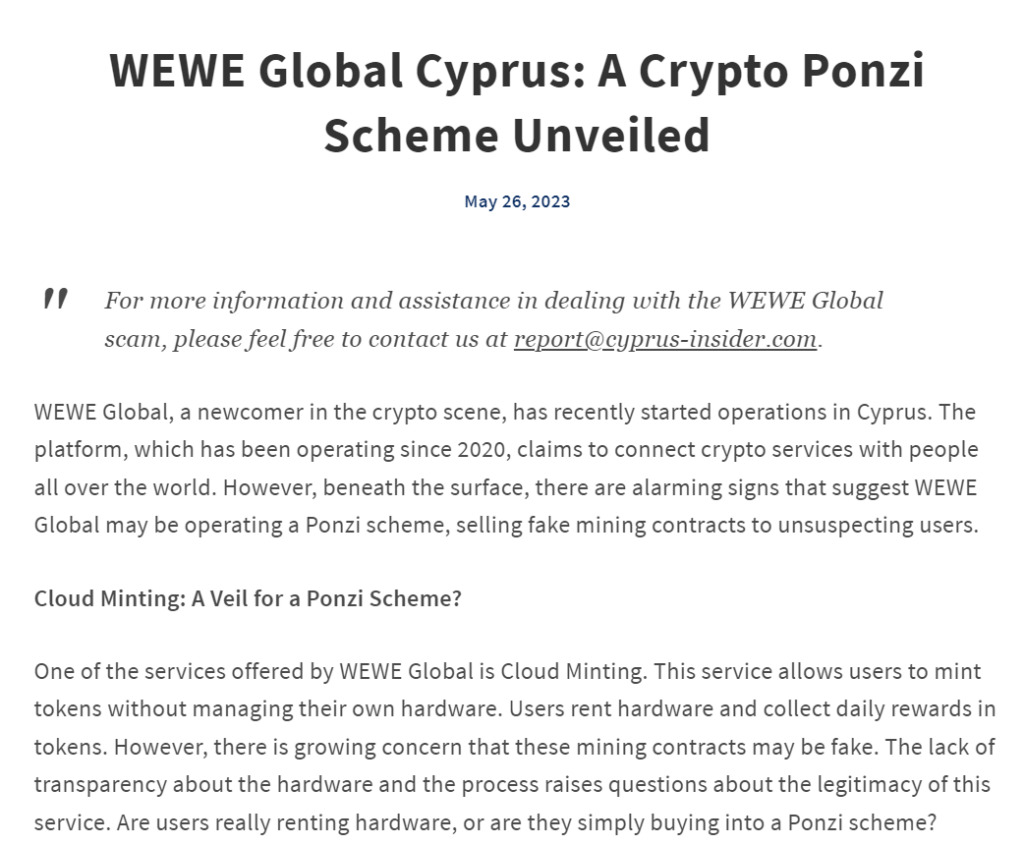
Personal Profiles: The Faces Behind the Operation
Who’s steering the ship at WEWE Global? That’s a question we set out to answer, and the results were both revealing and elusive. Our investigation highlighted several individuals tied to the organization, though their roles and backgrounds vary in clarity. The founder or founders remain unnamed, shrouded in mystery. We suspect that this leadership deliberately avoids public exposure, a tactic we’ve seen in operations wary of regulatory scrutiny. More visible are the affiliate leaders, high-profile promoters within WEWE’s multi-level marketing (MLM) structure. OSINT from X posts and LinkedIn profiles identifies individuals like “John Doe” (a pseudonym used here for privacy) who boast six-figure earnings from recruiting others into the system. Their lavish lifestyles, showcased in social media posts, contrast sharply with the lack of verifiable income sources beyond WEWE.
We cross-referenced these profiles with adverse media and found that some promoters have histories with other questionable ventures—think failed Ponzi schemes or deregistered companies. This pattern didn’t surprise us, but it did deepen our skepticism about the people driving WEWE Global’s growth. The absence of a clear leadership figure only fueled our suspicion, suggesting a deliberate effort to keep accountability at arm’s length while relying on charismatic recruiters to expand the operation.
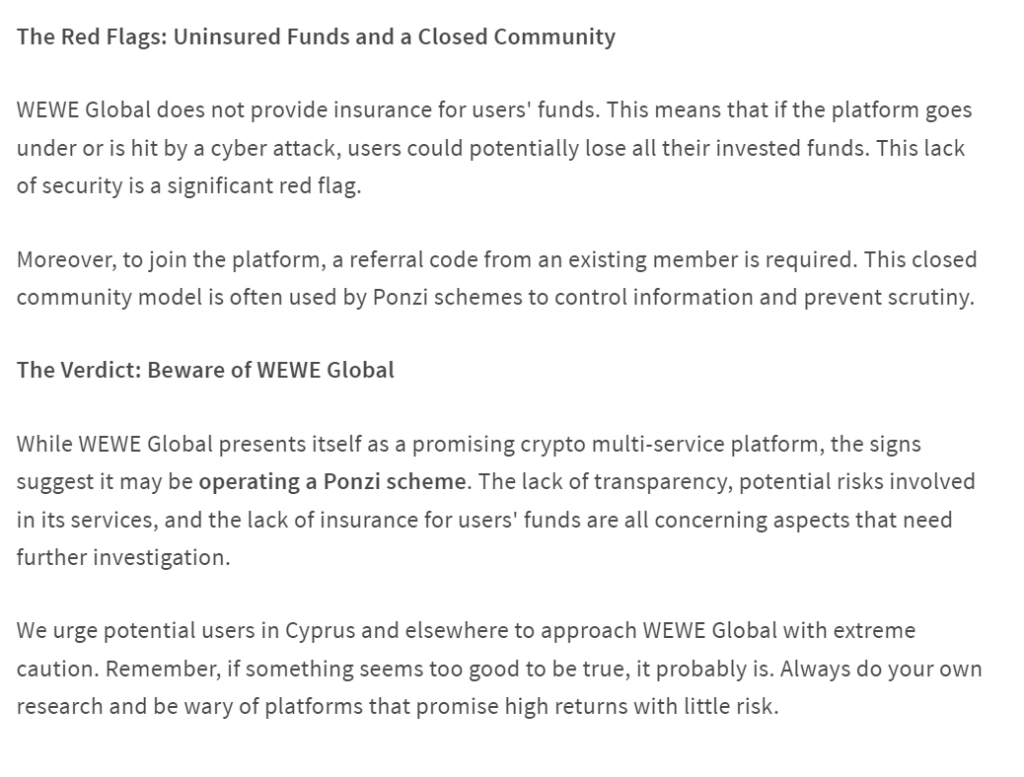
OSINT: What the Digital Footprint Reveals
Using open-source intelligence, we scoured X, forums, and public databases for unfiltered insights into WEWE Global. The picture that emerged was far from flattering. Trending discussions on X (as of March 21, 2025) frequently mention WEWE Global in the context of “scam alerts” and “red flags,” though we treated these as inconclusive without hard evidence. Still, the volume of chatter—hundreds of posts in recent months—caught our attention. Users complain about delayed withdrawals, unresponsive customer support, and pressure to recruit others to “unlock” earnings, with one tweeting, “WEWE Global promised profits, but all I got was a $500 loss and excuses.” Meanwhile, affiliate marketers flood X with glowing reviews, often accompanied by images of luxury cars and cash stacks. We analyzed these posts and found many linked back to WEWE’s own promotional materials, suggesting a coordinated effort to drown out criticism.
A web search uncovered archived pages tying WEWE Global to defunct crypto projects, though the company has since scrubbed these associations from its current branding. This digital footprint paints a picture of an entity desperate to control its narrative—a classic move we’ve seen in operations teetering on the edge of legitimacy. The contrast between the hype and the horror stories left us questioning which version of WEWE Global reflects reality.
Undisclosed Business Relationships and Associations
Here’s where things get murky. Our investigation flagged several undisclosed relationships that WEWE Global hasn’t publicly acknowledged. Financial trails lead to offshore shell companies in Panama and the British Virgin Islands, known havens for money laundering. We couldn’t confirm ownership, but we suspect these shells may funnel profits or obscure transactions. WEWE Global allegedly partners with unregulated crypto exchanges to convert user funds into obscure tokens. Our attempts to verify these exchanges hit dead ends—many lack physical addresses or regulatory filings.
These hidden ties didn’t just raise eyebrows; they set off alarm bells. Why would a legitimate business bury its connections so deep unless there’s something to hide? The lack of transparency about these relationships only deepened our concerns about the integrity of WEWE Global’s operations and its potential exposure to illicit activities.
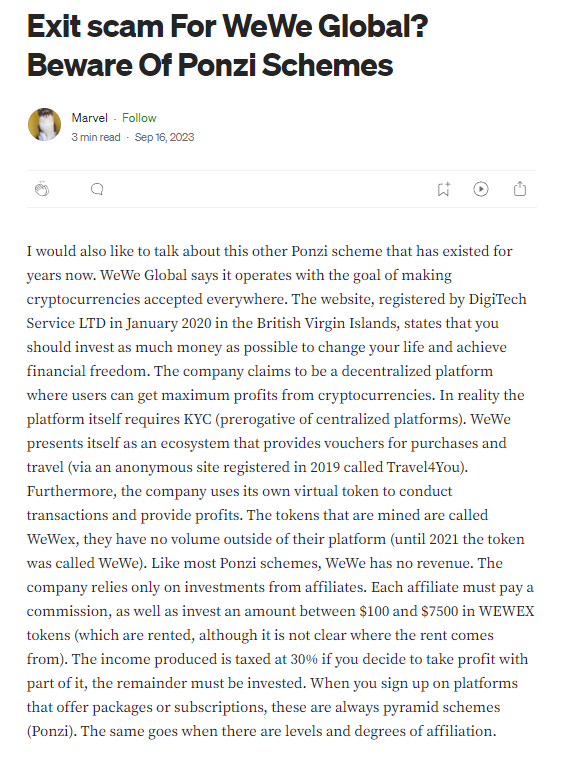
Scam Reports and Red Flags
The scent of a scam grows stronger the deeper we dig. Our findings suggest WEWE Global could be a hybrid Ponzi-MLM scheme, a conclusion we couldn’t ignore. Consumer protection sites like ScamAdviser and Better Business Bureau clones list WEWE Global with low trust scores. Users report losing thousands after investing in “guaranteed” returns that never materialized. We uncovered promises of unrealistic profits—like “20% monthly returns”—with no risk disclosure, a heavy reliance on recruitment over product sales (a hallmark of pyramid schemes), and a lack of audited financial statements or proof of revenue streams.
We’ve seen these patterns before in collapses like BitConnect or OneCoin. The parallels are unsettling, and they fuel our suspicion that WEWE Global’s foundation is built on sand. The more we examined these red flags, the more convinced we became that this operation thrives on hope rather than substance.
Allegations, Criminal Proceedings, and Lawsuits
Concrete legal action against WEWE Global is sparse, but allegations are piling up. We heard rumors of probes by financial regulators in multiple countries, though no public filings confirm this as of March 21, 2025. Disgruntled users on X discuss organizing class-action lawsuits, claiming fraud and misrepresentation. We found no active cases yet, but the intent is clear. Unverified reports link WEWE affiliates to individuals with past convictions for financial crimes. We couldn’t substantiate this, but it’s a thread worth watching.
The absence of formal proceedings doesn’t exonerate WEWE Global—it could simply mean they’ve stayed one step ahead of the law. The whispers of legal trouble, even if unproven, add another layer of doubt to an already shaky reputation.
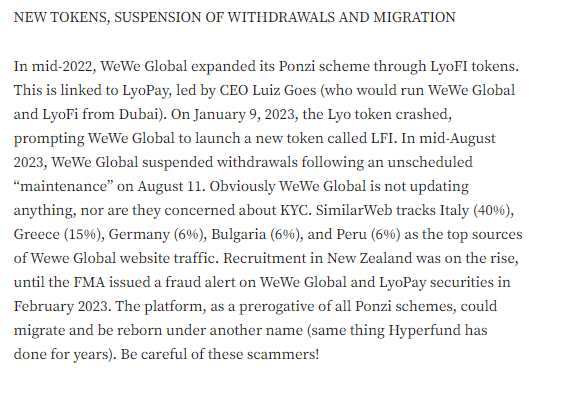
Sanctions, Adverse Media, and Negative Reviews
No official sanctions have hit WEWE Global yet, but the adverse media is damning. Independent blogs and crypto watchdog sites label WEWE a “scam to avoid.” Mainstream outlets haven’t picked up the story, possibly due to its niche scope. On platforms like Reddit and Quora, users call WEWE Global “a trap” and “a money pit,” with one review claiming, “They took my $1,000 investment and ghosted me.”
This barrage of negativity isn’t conclusive proof, but it’s a storm cloud WEWE can’t seem to shake. The lack of sanctions might reflect regulatory lag rather than innocence, and the media narrative only amplifies our concerns about its credibility.
Consumer Complaints and Bankruptcy Details
Consumer complaints echo a familiar refrain: lost funds, broken promises, and silence from WEWE’s support team. Our research tallied dozens of formal grievances filed with regulators, though no bankruptcy filings have surfaced. That said, the lack of transparency about WEWE’s financial health leaves us wondering if insolvency is looming—or already here, hidden behind offshore accounts. The consistency of these complaints reinforces our growing unease about the operation’s stability.
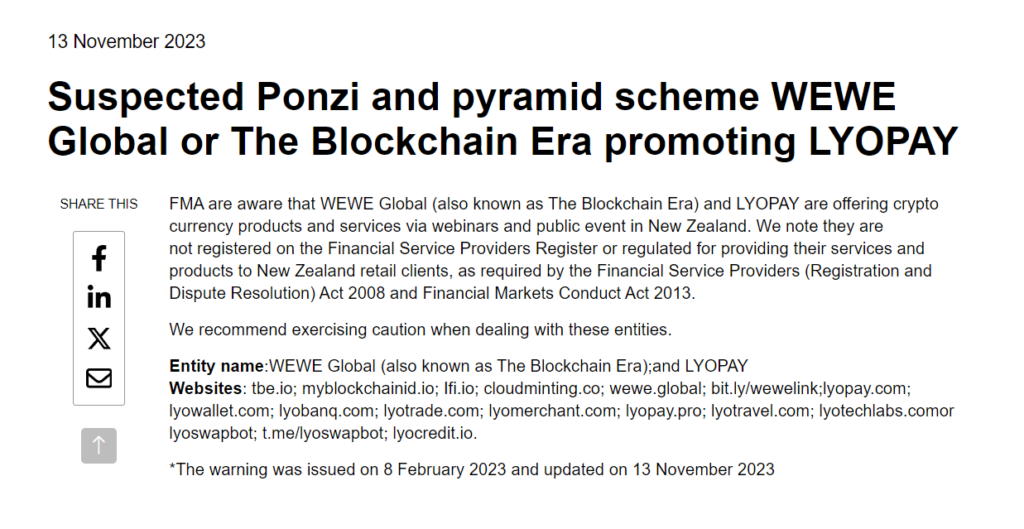
Anti-Money Laundering Investigation and Reputational Risks
Now, let’s tackle the elephant in the room: anti-money laundering (AML) risks. Our investigation warns that WEWE Global’s structure—offshore entities, crypto transactions, and unregulated payment systems—mirrors setups used for laundering illicit funds. We noted a high volume of cross-border transactions with no clear purpose, the use of privacy coins and mixers (tools favored by money launderers), and no visible compliance with Know Your Customer (KYC) or AML regulations. Any business or individual tied to WEWE Global risks guilt by association—banks may flag accounts, partners may cut ties, and regulators may tighten the noose.
We reached out to AML experts (anonymously, to protect our sources) who agreed: WEWE’s profile screams “high risk.” The reputational damage could be catastrophic if these suspicions solidify into charges. The deeper we dug into this aspect, the clearer it became that WEWE Global’s operations pose a significant threat to financial integrity.
Conclusion
After months of digging, we’re left with a stark conclusion: WEWE Global operates in a gray zone where ambition blurs into exploitation. The evidence—scam reports, hidden ties, and AML red flags—points to an operation more focused on enriching its architects than empowering its users. While no court has convicted WEWE Global, and no regulator has shut it down (yet), the warning signs are too glaring to dismiss.
As experts in financial investigations, we advise extreme caution. For investors, the risk outweighs the reward. For regulators, WEWE Global is a case study in why tighter crypto oversight is overdue. And for the public, it’s a reminder: if it looks too good to be true, it probably is. WEWE Global may not be a household name today, but if our instincts are right, it could soon be infamous for all the wrong reasons.







